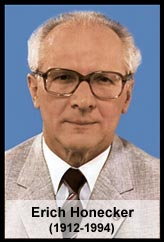
The Political Elite
Home
Introduction
Historical Background
The
Discussion
Goals &
Issues
Characters
Teacher's
Guide
Index
East Germany
About 1 percent of the population belongs to what may be termed thepolitical elite. This group includes party leaders at the national, district, and county levels; key persons in the state government and in industry, media, and education; and the heads of mass organizations. In their hands rests the bulk of political power and influence. They form the vanguard of society and purport to rule in the name of the working class.
General Secretary of the SED General Committee and Chairman of the GDR Council of State
The communist party in East Germany, the SED, is not, technically speaking, a mass political party. Yet the SED has a membership considerably larger than its counterparts in other East European communist countries. In 1986 SED membership (including candidates) was 2,304,121, or 13.2 percent of the adult population. One out of every six citizens over the age of neighteen belonged to the party. SED leaders have long boasted of their success in bringing workers into the party and in promoting to leadership positions those whose social origin is the working class. According to the SED's own statistics, the proportion of workers in the party has grown steadily and in 1984 reached 58.1 percent. The proportion of intelligentsia and cooperative farmers within party ranks has consequently declined, and in 1984 these two groups constituted 22.4 percent and 4.8 percent of the membership, respectively. Despite many differences in age, education, and social background, party members form a special social group, to some extent, in that they share a consciousness of belonging to a privileged section of the population. Career advancement is tied closely to party membership, and most top positions in government, industry, media, and education are held by party members.
The rank-and-file membership in reality wields little political power and has almost no voice in decision making and policy formulation. Out of the over 2 million party members, approximately 500,000 belong to the Nomenklatur, who are appointed to leading positions in the party, state, and economy. Members of the Nomenklatur make sure the system works, i.e., that policy directives are carried out, that production quotas are filled, that the educational system produces students equipped to fill priority positions, that the proper "socialist outlook" is reflected in the media, and so forth.
Membership in the political elite is based on a combination of party loyalty, training and on-the-job performance, and personal friendships. Party loyalty is by far the most important criterion. It involves a blend of devotion to Marxist-Leninist principles, loyalty to the state, commitment to socialist internationalism, and strict adherence to party discipline. An individual's record of political activity and length of service in the party and related mass organizations in large measure determine the likelihood of rising to a top leadership role within the party hierarchy. In the late 1940s and 1950s, party loyalty tended to displace all other considerations in selection of candidates for leading positions. Longtime party activists, most of whom had been active in the Communist Party of Germany before World War II and many of whom had received their training in the Soviet Union, were placed in control of the government after the war. Loyalists with little or no practical administrative or technical experience took charge of major industries. These members of the "old guard" tended to be party dogmatists.
Since the 1960s, a growing emphasis has been placed on performance-related criteria. It is no longer enough to be a loyal party activist; the aspiring candidate must also possess a certain amount of talent and skill, oftentimes based on intensive scientific and technical education. The professionalization of the party leadership is apparent in the structural breakdown of the Politburo. In 1984, of twenty-five full and candidate members of the Politburo, fifteen had an elementary school education, five had completed high school or technical school, and 20 had a university degree. In 1946, by comparison, thirteen of the fourteen Politburo members had only an elementary school education. In early 1987, almost three-quarters of the Central Committee members (including candidates) were graduates of a university or technical school.
Elite membership is linked to the web of personal friendships and political alignments that party activists weave as they rise in the hierarchy. There is an "old-boy" network that operates within the SED, particularly at the highest levels of party leadership. Thus, for example, Ulbricht, first secretary of the SED from the time of its establishment to his retirement (removal) in 1971, surrounded himself with trusted friends who had spent the war years with him in the Soviet Union. Honecker, his successor, has selected his friends and associates from the Free German Youth (Freie Deutsche Jugend--FDJ) apparatus to fill key political positions.
The members of the political elite display many of the characteristics of a new class, a class that has replaced the old landed aristocracy and upper class of the prewar era. Members of the political elite share a conscious social identity and a commitment to communist ideology. While tensions sometimes surface between the older, more dogmatic party leaders and the younger, more pragmatic members, both have a prevailing commitment to the system and a vested interest in maintaining it. Differences
relate primarily to style and not ideology. Individual commitment is generally strengthened as members of cadres rise in the political hierarchy. Members of the political elite also share a common life-style and receive certain benefits by virtue of their
position. They are materially better off than the population at large; they have access to comfortable housing; and their children are ensured a place at a university. In addition they are permitted freer travel abroad. The political elite is a relatively stable group. Unless serious doubt is cast upon a member's party loyalty or unless the member's job performance is very poor, his or her position remains fairly secure.
At the same time, membership in the elite is not closed. Virtually anyone can advance in the party hierarchy by displaying a balanced blend of political loyalty and talent. As time passes, however, the political elite may become a self-perpetuating social class as members attempt to secure for their children the same privileges they themselves have enjoyed.
Data as of July 1987 Except from The Library of Congress Country Studies.
<< Previous
Home - Introduction - Historical Background - The Discussion
Goals & Issues - Characters - Teacher's Guide - Index
Goals & Issues - Characters - Teacher's Guide - Index

Foothill College, 12345 El Monte Road, Los Altos Hills, CA 94022-4599
News & Info - Apply & Register - Degrees & Programs - Catalog & Schedule - Student Services
